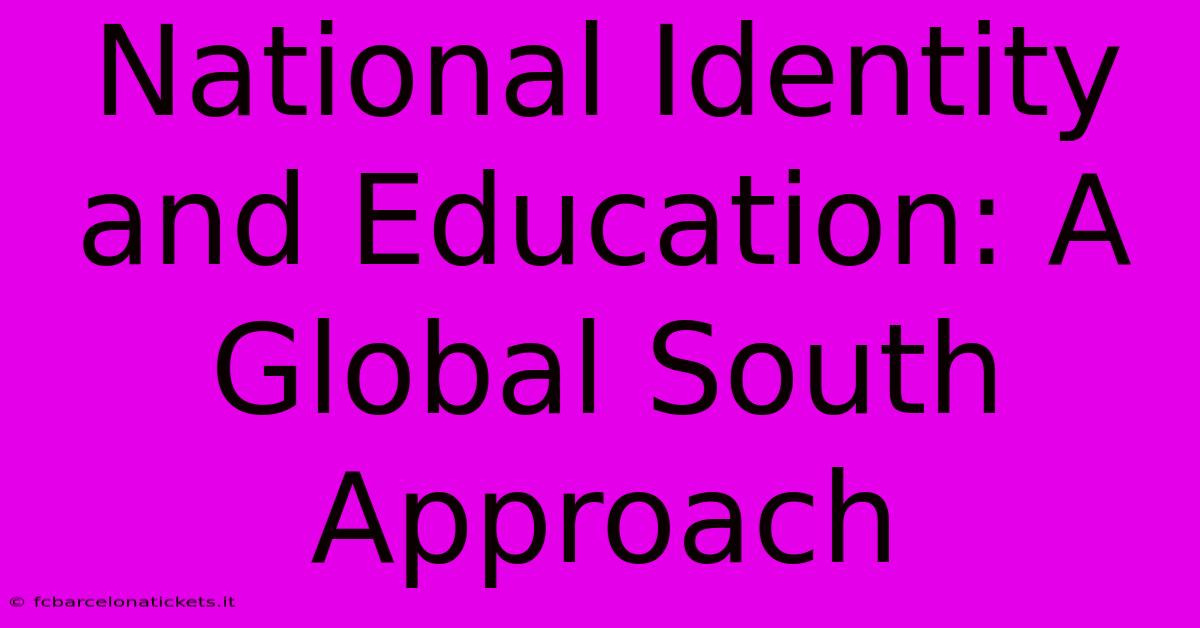National Identity And Education: A Global South Approach

Table of Contents
National Identity and Education: A Global South Approach
The relationship between national identity and education is complex and multifaceted, particularly within the Global South. Education isn't simply a tool for individual advancement; it's a powerful instrument shaping national narratives, fostering civic engagement, and influencing the very definition of what it means to be a citizen of a particular nation. This article explores this intricate connection, focusing on the unique challenges and opportunities faced by nations in the Global South.
The Role of Education in Nation-Building
For many post-colonial nations in the Global South, education played – and continues to play – a crucial role in nation-building. Following periods of often tumultuous independence struggles and colonial legacies, education became a vital tool for:
- Creating a Shared National Identity: A unified national identity is frequently constructed through shared history, language, and cultural narratives. Education systems are instrumental in disseminating these narratives, creating a sense of belonging and collective purpose among diverse populations. This process, however, is often fraught with challenges, particularly in nations with significant ethnic or linguistic diversity.
- Promoting National Unity and Social Cohesion: Education can serve as a bridge between different social groups, fostering understanding and tolerance. Inclusive curricula that celebrate diverse cultural contributions can help to counter divisive narratives and build a sense of shared national identity. However, poorly designed curricula can inadvertently exacerbate existing social divisions.
- Developing Human Capital: Investing in education is crucial for economic development. A skilled and educated workforce is essential for attracting foreign investment, promoting innovation, and creating economic opportunities for all citizens. This is especially critical in the Global South where many nations are striving to overcome poverty and underdevelopment.
- Promoting Civic Engagement and Participation: Education equips citizens with the knowledge and skills necessary to participate meaningfully in democratic processes. Critical thinking, problem-solving, and engagement with diverse perspectives are vital for informed and active citizenship.
Challenges and Considerations
Despite its potential, the relationship between national identity and education in the Global South faces significant challenges:
- Colonial Legacies: Many education systems in the Global South are still grappling with the legacies of colonialism. Curricula may continue to reflect colonial perspectives and priorities, undermining efforts to foster a truly national identity.
- Linguistic Diversity: The presence of multiple languages can create challenges in developing a unified national curriculum and ensuring equitable access to education for all.
- Resource Constraints: Limited resources often restrict access to quality education, particularly in rural and marginalized communities. This inequality undermines efforts to build a truly inclusive national identity.
- Political Interference: Political instability and interference can undermine the effectiveness of education systems and hinder efforts to promote national unity.
- Globalization and Cultural Homogenization: The impact of globalization and the potential for cultural homogenization pose a threat to the preservation of distinct national identities. Finding a balance between global interconnectedness and the maintenance of unique cultural heritage is a significant challenge.
A Case Study Approach: Diverse Examples from the Global South
Examining specific case studies from across the Global South reveals the varied ways in which education has been utilized (and sometimes misused) in the process of nation-building. Some countries have successfully leveraged education to promote national unity and development, while others continue to struggle with the legacies of colonialism and inequality. Further research into specific countries and their unique educational contexts would provide a richer understanding of this complex issue.
Conclusion: Towards a More Inclusive Approach
Education's role in shaping national identity in the Global South demands careful consideration. Moving forward, a more inclusive and equitable approach is crucial. This requires:
- Decentering Colonial Narratives: Curriculum reform is essential to decolonize education and incorporate diverse perspectives.
- Promoting Linguistic Diversity: Recognizing and valuing multiple languages can foster inclusivity and strengthen national unity.
- Investing in Equitable Access: Addressing resource disparities and ensuring equitable access to quality education for all is critical.
- Fostering Critical Thinking: Education should empower citizens to engage critically with national narratives and participate actively in shaping their society.
Ultimately, the goal is to build a national identity that is inclusive, respectful of diversity, and promotes the well-being of all citizens. Education, when implemented thoughtfully and equitably, can be a powerful catalyst in achieving this goal. Further research and dialogue are essential to navigate the complex challenges and realize the transformative potential of education in the Global South.

Thank you for visiting our website wich cover about National Identity And Education: A Global South Approach. We hope the information provided has been useful to you. Feel free to contact us if you have any questions or need further assistance. See you next time and dont miss to bookmark.
Featured Posts
-
Barcelona Taxis Your Ultimate Credit Card Guide
Apr 03, 2025
-
The Mediterranean Awaits Train From Marseille
Apr 03, 2025
-
Escape The City Mallorca Day Trips From Barcelona
Apr 03, 2025
-
Your Guide To Authentic Barcelona Drinks
Apr 03, 2025
-
Barcelonas April 2024 Weather A Day By Day Breakdown
Apr 03, 2025
